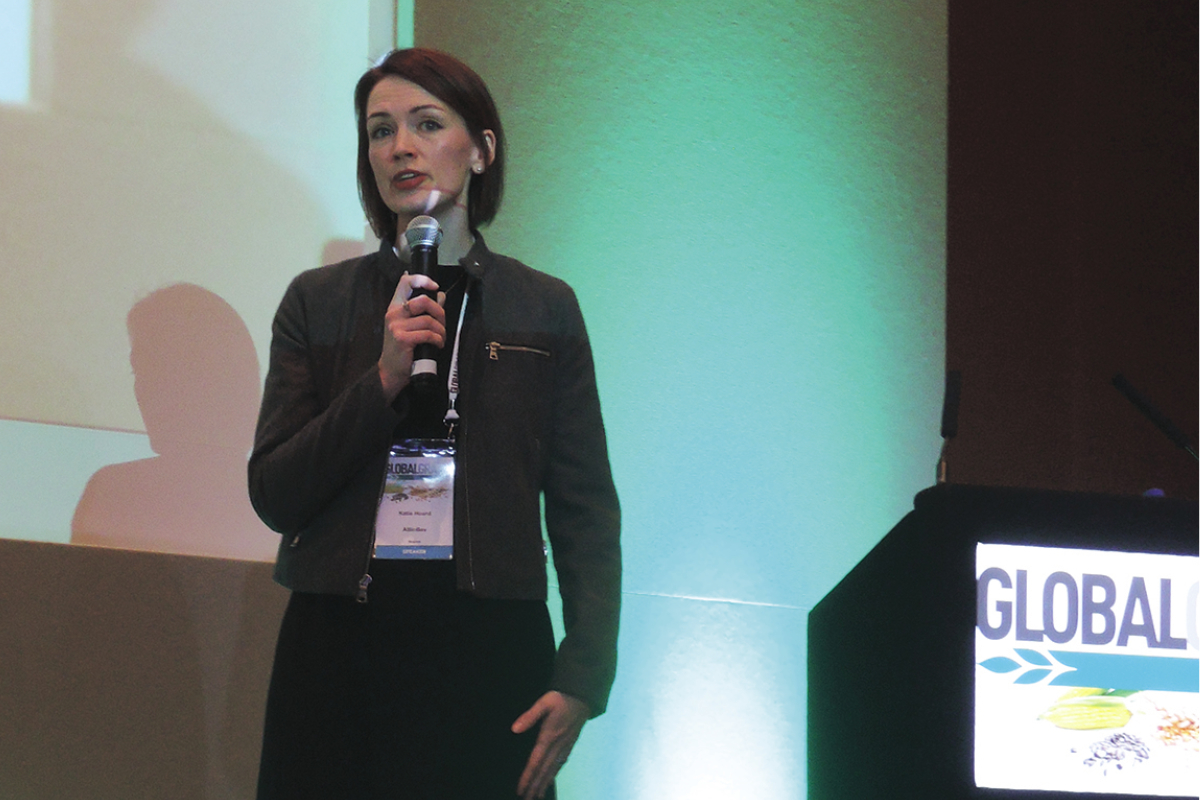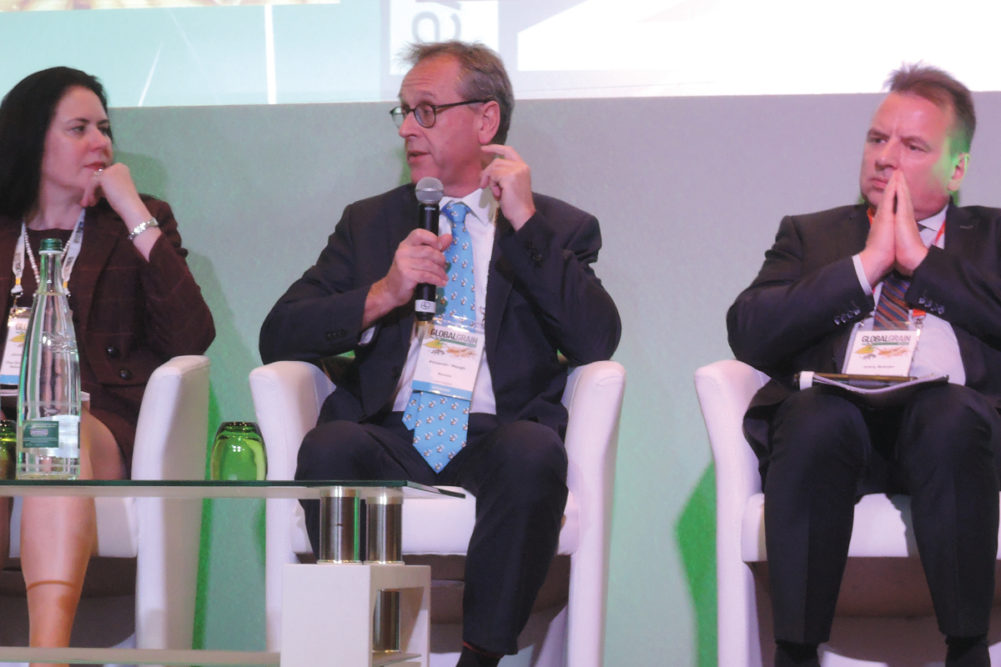Experts at the Global Grains Conference, held in November in Geneva, Switzerland, took turns discussing challenges facing the world’s grain sector, including the impact of African swine fever (ASF) on demand for feed, issues surrounding environment and regulation, changing consumer demands and tastes, and the still growing role of the Black Sea region as a supplier.
In a panel on grain consumption, Nick Major, president of FECAC, the European feed producers’ association, and corporate affairs director of the U.K. feed company ForFarmers, said ASF “clearly is a key issue for us here in Europe.”
He described the environmental agenda as “the overarching policy framework for the incoming European Commission,” referring to what is known as the “Green Deal” being brought in by the new European Commission.
A pressing issue for those involved in animal protein is trying to achieve climate neutrality, he said.
“Can we get to zero carbon?” he wondered.
Livestock farmers are being singled out, in his view, in the drive for zero pollution in Europe. The new European Commission also has focused on the idea of farm-to-fork, highlighting animal health welfare.
European livestock production also is being affected by trade issues like the call for a deforestation-free supply chain.
There is also concern over pesticide residues.
“Europe is taking a very cautious approach to renewals on the active substances,” Major said.
Another challenge is the regulatory approach to new plant breeding techniques. Major highlighted the European Court of Justice ruling that brings new breeding techniques into the scope of the controls on genetically modified organisms, something the industry wasn’t expecting.
“There will be a commissioner or senior director general for policy coherence,” he said. “I don’t envy the job. One thing we will learn from the GM debate is let’s take the public with us. You can’t have one without the other.”
Changing consumer demands

Alex Waugh, director of the National Association of British and Irish Flour Millers, said “the way we think about things is led by our consumers.”
“The challenge when you talk about consumer groups is that they are not all the same,” he said. “There’s a group of consumers for whom price is very important.”
However, others don’t mind paying more for higher-quality products.
“We are moving away from a world where people buy a physical commodity to one where they buy a commodity with a package of information attached to it,” he said.
Johny Boerjan, vice-president of technical governance for SGS Group, Switzerland, said he saw a shift in consumer requirements on information.
“They want to have food transparency,” he said.
Asked by a delegate about trends in meat demand, Major said, “reduced meat consumption goes against all the mega trends.”
“We have some of the most efficient livestock production in the world,” he said. “Why would we export meat production from the most efficient to the least efficient areas? The effect of a meat-free diet on CO2 emissions is very small. Ruminants use land in many parts of Europe that can’t be used for anything else.”
Beorian added, “We have to maximize the feed ingredients that we use that are non-human edible.”
Waugh said the world is moving away from commodities.
“We have consumers and customers who want more and more specific things,” he said. “We need to move away from thinking of the consumer as a big block.”
Food security
In a discussion on trading patterns in the Mediterranean and Middle East regions, Arnaud Petit, executive director of the International Grains Council, said “food security is really a matter of concern.”
Malak Al-Akiley, founder and managing director of Golden Wheat in Jordan, said the country produced enough wheat last year to last only seven days.
“Food security is vital,” she said.
Noting that 20% of the country’s population are refugees, she said that “at least one in five are unable to afford the ideal diet.”
It wouldn’t take much money to solve that problem.
“It would cost around $2.84 per day per person,” she said. “In our part of the world, we are still lagging behind” in the use of technology.
Dmitri Rylko, general manager of IKAR in Russia, said during a panel discussion on the prospects for the Black Sea region that “there is no doubt that our region still has untapped capacity to grow.”
“Annual growth has been incredible for the last 10 to 15 years,” he said.
Nikolay Gorbachov, president of UGA, Ukraine, said that in 10 years Ukraine will double grain production.
“We live in a big country,” he said. “We’ve got really good infrastructure.”

Comparing an average U.S. yield of 11 tonnes a hectare with Ukraine’s seven tonnes, he said, “I am pretty sure we can do the same.”
There are problems with a shortage of locomotives, and a new plant is being built to construct them, to make up for those lost because of war.
Ukraine has passed a new land ownership law that Gorbachov believes would help the farming industry to consolidate and become more efficient.
“They had no right to sell their land,” he said. “Now they will have the right to buy land and accumulate plots.”
Swithun Still, director of Solaris Commodities of Switzerland, looked at the Russian situation and said new markets are opening.
He highlighted Algeria, calling it “a big market that is very exciting.”
“The French export promotion body France Export Céréales is certainly doing great lobbying,” he said, but stressed that he expected Russia to get into the North African market. “I think it’s a question of when, not if.”
Turning to the attitude of Russian farmers, Still said he met with several recently and they were “smiling from ear to ear.”
“Everything has been very profitable for them,” he said. “Gone are the days when the Russian farmer was always selling at harvest.”
Sumit Gupta, business manager of India-based McDonald Pelz, told a panel on the Southeast Asian grain value chain that “the entire world is looking toward Southeast Asia,” including India and Pakistan in the region.
“Production in this region is not growing,” he said. “The only thing that is growing is population.”
Fred Humberg, CEO of Agribrasil, said there is a great market and a great opportunity for Brazil on the consumption side.
The view of Rodrigo Carcamo-Diaz, economic affairs officer at UNCTAD (United Nations Conference on Trade and Development), was that “the whole region is increasing consumption of protein as people become richer.”
Brent Babb, regional director, Greater Europe and Middle East/North Africa (MENA), U.S. Soybean Export Council, said during a panel on how trade barriers and oversupply are affecting the North American market that “China is still the No. 1 country for exports, even with the (U.S.-China) trade war at its worst.”
Babb said he did not think the soybean market had changed permanently.
“It’s hard to see a lot of positive out of it,” he said. “We were still down around 20%. Europe was our largest export market.”






